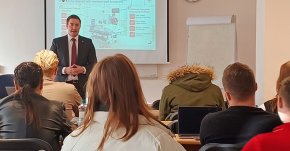
21/11/2017 - Securitizing Energy: From Geopolitics to Energy Democracy
Center for Security Studies cordially invites you to postdoc public lecture "Securitizing Energy: From Geopolitics to Energy Democracy" by Izabela Surwillo.WHEN: Tuesday, 21 November 2017, 16:00–17:30
WHERE: MUP Prague-Strašnice building, Dubečská 900/10, room no. 305
Free entry, no registration required.
Abstract: Energy security emerged as one of the ‘new’ security issues in the post-Cold War era. Due to its ‘total’ character it impacts all sectors of human activity as well as other security areas – political, societal and environmental included. However, the vast majority of energy security analysis tends to focus on the local and global market forces and narrowly defined economic indicators for operationalizing energy security. The mainstream research is also primarily conducted from a limited methodological perspective that often relies on economic modeling, but rarely includes qualitative data that would give more consideration to the multiplicity of local actors, agendas and perspectives. Yet, the contextual analysis of the energy security phenomenon shows that the realist focus on the geopolitics of gas/oil supply and the ‘zero-sum’ game of pipeline politics are only a part of the story. Similarly to the analysis of climate security, the security dynamics of the contemporary energy sector defies the logic of exception as the dominant and universal logic of security. Namely, not only the logic of risk, war and subsistence shape local energy security agendas, but the emerging logic of emancipation increasingly plays a role in different national settings. Characterized by the gradual democratization of energy systems, individuals as the referent objects of security, the rhetoric of social empowerment/liberation and reflexive security practice – the energy security logic of emancipation marks yet another mutation of the meaning and practice of energy security and has important policy consequences for the domestic contexts. The presentation will look at this phenomenon in greater detail at the example of Germany, Poland and Ukraine.
News
 Erasmus Prague Tour
18. 3. 2024 Author: Berkcan Tokyay
On the 2nd March 2024, we had our traditional Prague tour for the summer semester Erasmus students and MUP Buddy Team members.
Erasmus Prague Tour
18. 3. 2024 Author: Berkcan Tokyay
On the 2nd March 2024, we had our traditional Prague tour for the summer semester Erasmus students and MUP Buddy Team members.
 MUP Hosted a Day Dedicated to Japan
11. 1. 2024 Author: Michal Kolmaš
A special event dedicated to Japan offered students the chance to taste Japanese sweets, roll their own sushi, write Kanji characters, and discuss the unique country with several Japanese students studying at MUP.
MUP Hosted a Day Dedicated to Japan
11. 1. 2024 Author: Michal Kolmaš
A special event dedicated to Japan offered students the chance to taste Japanese sweets, roll their own sushi, write Kanji characters, and discuss the unique country with several Japanese students studying at MUP.
 Career Paths Unveiled: Lessons from LINET's Managing Director for Asia
3. 1. 2024 Author: Lea Melnikovová
Just before the Christmas break, Mr. Alexandr Jernek, LINET's Managing Director for Asia, generously spared time from his hectic schedule for us.
Career Paths Unveiled: Lessons from LINET's Managing Director for Asia
3. 1. 2024 Author: Lea Melnikovová
Just before the Christmas break, Mr. Alexandr Jernek, LINET's Managing Director for Asia, generously spared time from his hectic schedule for us.